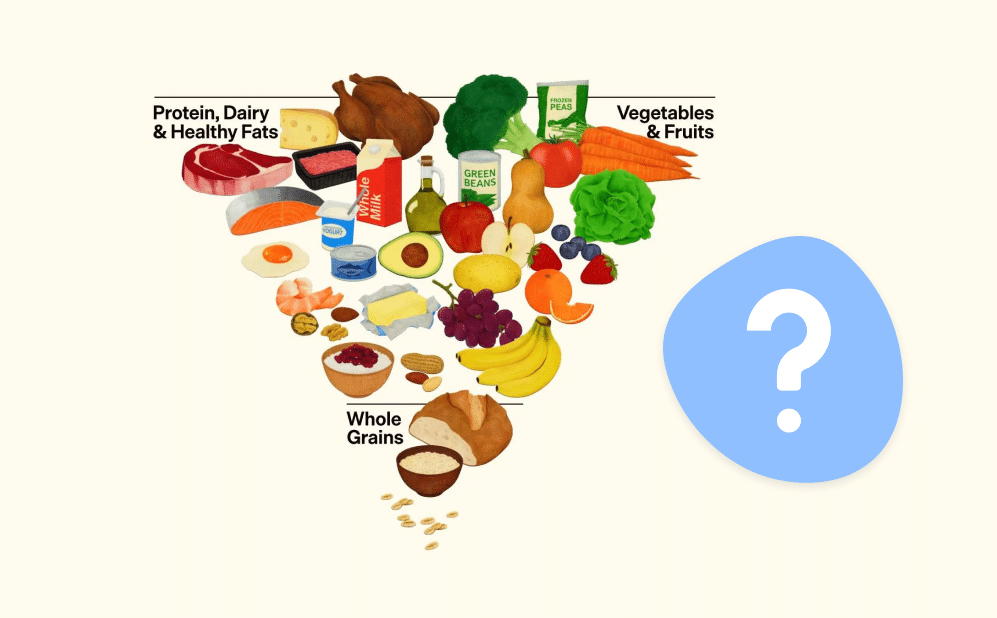If you have a chronic GI condition—such as bloating, abdominal pain, constipation, diarrhea, acid reflux, or something else—working with a GI dietitian, rather than going it alone when it comes to nutrition, can be a huge help. A GI dietitian can tailor your diet to help alleviate symptoms, prevent flares, and manage flares when they do occur.
The world is full of nutrition or diet advice, some of it helpful, some of it not, some of it blatantly wrong. Much of the info out there is conflicting and confusing and doesn’t account for bio-individuality. Bio-individuality is the concept that even the same foods affect individuals differently, based on many factors, including your GI health status and specific symptoms.
As anyone with a GI issue likely knows, even some seemingly healthy foods can trigger symptoms of some conditions or worsen an in-progress flare. In other words, an apple a day does not always keep the doctor away. Instead, it may have you booking an appointment with your gastroenterologist, stat!
A gastrointestinal registered dietitian can help you cut through the noise and find a healthy eating routine that works for you. Your GI expert can also help you change your diet when necessary—because changes in your condition status can warrant a temporary change in your nutrition plan.
We get it though: The very term “dietitian” can conjure images of someone building a list of off-limits items, restricting you from eating the foods you love and leaving you unsatisfied or dreading mealtime.
You may wish to look for a GI registered dietitian who takes an additive approach first by seeing what foods can be incorporated into your diet to enhance GI health. They can work with you to create strategies for consuming your favorite foods, rather than relegating items to a no-no list.
Here, we’ll look at what GI registered dietitians do, how one can support you, how to find one, and more.
What is a GI dietitian and what do they do?
Gastroenterology is a branch of medicine that focuses on the esophagus, stomach, intestines, liver and the pancreas—a.k.a. your whole GI tract. A GI registered dietitian is one who has specific expertise in nutrition strategies that support gastrointestinal health.
“Unlike a general registered dietitian,” says Mayra García-Zeda, a GI registered dietitian with Oshi Health, “a GI dietitian has a deep understanding of GI physiology and can provide more targeted, evidence-based interventions specific to digestive conditions.”
An evidence-based approach is crucial for supporting people with diagnosed GI conditions as well as those with ongoing GI symptoms that may not be linked to a diagnosis.
Why should you see a GI registered dietitian?
Here are five reasons why working with a GI dietitian can make a huge difference in your digestive health, even if you’ve worked with a dietitian in the past and gave a thumbs down to the process.
1. Specific expertise in GI conditions
Nutrition can have a dramatic effect on anyone’s health, and it’s a key component in managing health conditions. But in medical school, doctors receive sparse training on diet. Their nutrition education often focuses on vitamin and nutrient deficiencies, total parenteral nutrition, and nutrition in critically ill patients.
For a registered dietitian, the bulk of their education and training entails a nutrition focus. They must earn a master’s degree and complete 1,000 hours of supervised practice. In addition, some dietitians have specialties. For example, they may have extra training in diabetes care, pediatrics, sports, eating disorders, obesity, and more. And some dietitians focus on GI health.
GI registered dietitians have deep expertise not just in nutrition, but specifically in gastrointestinal nutrition. They are experts in understanding the relationship between food and GI health. And they recognize the need for a customized approach.
“GI dietitians are skilled in identifying triggers, recommending specialized diets, and tailoring nutrition plans to manage symptoms effectively,” says Michael Bass, MD, a gastroenterologist at Oshi.
2. Personalized dietary changes for your condition
One GI condition or symptom is different from the next. Plus, even when considering two people with the same GI condition or symptoms, their diets may need to be substantially different. Several factors can be at play.
You need a diet that’s unique to you if you:
- Are in a stable maintenance phase of your condition
- Are in the heat of a condition flare
- Have food intolerances or allergies
- Have vitamin or mineral deficiencies
- Have nutrition needs for supporting your activity level
- Have other chronic conditions that require diet strategies
- Have specific diet preferences (e.g., vegan, keto, etc.)
- Have foods you love
- Have foods you dislike
A GI dietitian can help you figure out what type of dietary modifications may be best suited for you, taking into consideration your condition, symptoms, dietary intake, and more. They will work to address your GI concerns and help you make any needed dietary changes that are sustainable by incorporating your lifestyle, preferences, and needs.
“Oshi takes an additive approach to nutrition plans, focusing on sustainability and less disruption to patients’ lifestyles,” García-Zeda says.
GI dietitians are all about figuring out a plan that helps your condition or alleviates a specific symptom. But they are also all about making sure your diet isn’t restrictive and is one that you can maintain.
“Instead of eliminating foods,” García-Zeda says, “we emphasize adding beneficial options that support health and well-being, fostering a positive relationship with food and promoting long-term adherence to the plan for lasting health outcomes.
Part of ensuring a diet is sustainable is building one you like. If you dislike the texture of mushrooms, for example, your GI dietitian will forego fungi on your plan. Likewise, if you love the occasional ice cream, your GI dietitian will work to find a version that you can still treat yourself to when the hankering strikes.
You may also enjoy foods that are considered part of your culture. A GI dietitian can build strategies for including those favorites in your plan.
“Our dietitians aim to create the most balanced and liberalized healthy diet possible, teaching patients how to incorporate nutritious foods that make them feel amazing while also improving their symptoms,” Dr. Bass says.
3. Fewer trial-and-error diet changes
Many generalized—meaning not customized for you—nutrition plans for people with GI conditions or symptoms feature an elimination diet. Elimination diets involve a period of eliminating certain foods (bye-bye, avocado) followed by a period of reintroducing them to see if they are a symptom trigger.
Some elimination diets are evidence-based and can be helpful in certain circumstances. But in other situations, they may not be needed or could even lead to additional symptoms, brought on by an altered gut microbiome (the mix of bacteria and fungi that live in the gut) or nutritional deficiencies.
A GI dietitian knows when an elimination diet is likely necessary and when it may not be. The distinction can often spare someone the burden of a difficult process. But it may also help someone achieve symptom improvement faster. (So long, diarrhea.)
If an elimination diet is needed, a GI dietitian can help you create strategies for following it that minimize disruptions to your everyday life.
“We help patients identify dietary triggers, provide personalized nutrition advice, and navigate specialized diets, such as gluten free or low FODMAP, to ensure balanced nutrition and symptom management, ultimately empowering patients to manage their GI conditions independently,” García-Zeda says.

4. One-on-one support and education
A GI dietitian can make a customized nutrition plan that meets your unique needs. Working with a GI dietitian can make following diet protocols much easier with education, resources, guidance and strategies that are tailored to YOU.
Whatever the plan, you are the person who must follow it. Research shows that—compared to standard dietary advice that doesn’t take the individual into consideration—customized nutrition plans may produce better results for various health issues, including GI conditions.
Plus, if you have a GI condition, you’re probably all too aware that symptoms change. One week you might be feeling great, and the next, you might be in the throes of a flare. A GI dietitian can help you adjust your diet as needed.
5. Integrated care from a dedicated team
“At Oshi, a GI dietitian works as part of an interdisciplinary team that includes GI providers, gut-brain specialists, and registered dietitians collaborating on challenging cases to achieve symptom resolution through teamwork,” García-Zeda says.
Your team will work together—and partner with you—to ensure that your plan is working, make any necessary dietary modifications, and provide you with the support you need along the way.
“I have been so happy with the support I've received from my Oshi care team! From my meetings with my GI provider, dietitian, and gut-brain specialist, and the care coordinators, I've gotten all the support and information I need to manage my IBS. Everyone is unbelievably responsive. In the short time I've been in the program, I feel SO much better. The app is great. I'm one pleased patient!”
— P.G., treated for IBS
When should you see a GI dietitian?
You may wish to see a GI dietitian if you have new or chronic digestive issues or have a diagnosis of a GI condition, García-Zeda says.
Symptoms and conditions that may benefit from a visit with a GI dietitian
Symptoms
- Abdominal pain or cramping
- Bloating
- Constipation
- Diarrhea
- Gas
- Nausea
- Additional/undiagnosed symptoms
Conditions
- Gastroesophageal reflux disease (GERD) or acid reflux
- Irritable bowel syndrome (IBS)
- Small intestinal bacterial overgrowth (SIBO)
- Crohn’s disease
- Ulcerative colitis
- Gastroparesis
- Fatty liver disease
How do you find the right GI dietitian near you?
If you have an existing GI provider, you may be able to find a GI dietitian through their clinic. However, if you’re looking for an option that’s convenient, accessible, and tailored to your unique needs, consider Oshi’s virtual offerings.
Oshi “prioritizes quality results and patient outcomes,” García-Zeda says. “Our whole-person therapy program offers unlimited virtual visits and as much support as needed to help patients gain and maintain symptom control, providing comprehensive and patient-centered care. This commitment means working with patients until they reach symptom resolution and can live their best life.”
Meet Oshi's GI registered dietitians
Find relief—and stay nourished
When you work with an Oshi GI registered dietitians (RD), you’ll get personalized nutrition guidance, including help with finding and avoiding potential food triggers, choosing gut-friendly supplements and recipes, and more.
What should you expect at your first appointment with a GI dietitian?
Your first appointment with an Oshi GI registered dietitian is comprehensive. Here’s what you can expect.
“We’ll review their medical history, assess symptoms, and discuss food preferences along with lifestyle factors,” García-Zeda says. “We’ll go deep into their diet to identify potential triggers of GI symptoms.”
Your GI dietitian will perform a complete nutrition assessment, create a personalized care plan to address your symptoms, and provide you with tailored education.
“Our goal is to provide our patients with the tools and support needed for effective symptom management and improved quality of life,” García-Zeda adds.
Ready to see how a registered dietitian can help you manage your GI symptoms? Get started today.
Oshi is your partner in digestive health
Feel like your digestive concerns are running your life? You’re not alone—and we’re here to help you find lasting relief.
Oshi Health GI providers, gut-brain specialists, and registered dietitians work together to address your symptoms and find solutions that actually work for you.
Whether you’re dealing with chronic digestive issues or unpredictable symptom flare-ups, our GI specialists deliver:
✔ Personalized care plans tailored to your lifestyle
✔ Science-backed strategies to calm your gut
✔ Compassionate, whole-person care
✔ And so much more!
Ready to take control of your gut health?












